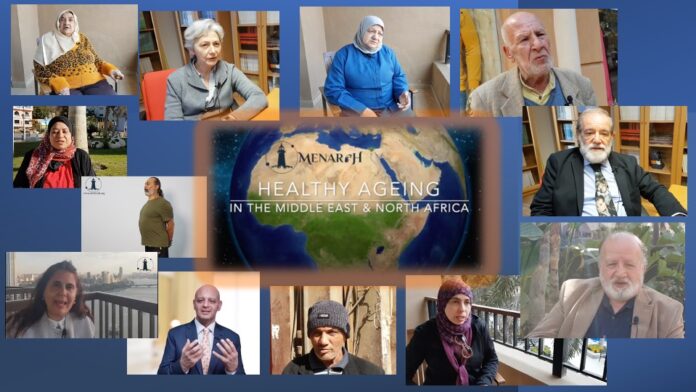The MENARAH Network goals are inspired by the UN Decade of Health Ageing action areas within the specific social, demographic and geo-political context of the Middle East and North Africa Region.
Population ageing is often a neglected policy dimension in the region due to competing policy challenges associated with population growth, poverty and youth unemployment. However, the population ageing is so fast that within as little as 15-20 years, some countries in the region will transfer from young to ageing populations. Yet, awareness of these issues and the specific meaning of healthy ageing in the MENA region is minimal. More importantly, the voices of older people and their families are seldom heard.
The Network activities are designed to promote the discussion of ageing and associated policy and practice implications. MENARAH’s approach relies on partnership building and cross-learning, utilising existing data and knowledge most effectively and ensuring voice and meaningful engagement. Since its inception, the MENARAH network has nurtured connections across international, national and local actors.
In 2022, the MENARAH Network undertook several engagement activities with older people and their families in the MENA region to understand the factors necessary to promote healthy ageing. We further engaged with key policy and practice stakeholders about the same topics. To raise awareness about healthy ageing in the MENA region, MENARAH produced a short mosaic video summarising some of the key messages from this work, highlighting some facilitators, challenges, and potential regional interventions. The video includes clips from policymakers, researchers, NGOs, older people and their families.
Healthy ageing can be challenging to define, as it includes subjective and objective aspects. Therefore, considering healthy ageing as a holistic state beyond health conditions or functional limitations is crucial. One of the critical challenges to healthy ageing and the uptake of healthy ageing behaviour may relate to the individual and societal perception of ageing. Specific to the region is to promote the independence of older people and create meaningful opportunities for participation in various aspects of society, where older people gain a sense of purpose and importance. It is crucial to empower older people and their families to establish and demand their needs. Maintaining good physical and psychological health is key to ensuring healthy ageing; however, managing health conditions while continuing to participate as desired provides healthy ageing. It is paramount to ensure the voice of older people from all walks of life when designing and implementing healthy ageing interventions in the region. A process that requires all actors, from international organisations to individuals, to work together.
MENARAH continues to nurture connections and ensure the utilisation of evidence and research to enhance the quality of life of older people in the MENA region and contributes toward the UN Decade’s core aims of combating ageism, creating age-friendly environments, and establishing integrated care and long-term care systems.
Public Engagement Small Grants Scheme Continued Development Grant from the London School of Hygiene & Tropical Medicine supported this work.
Founder and Director
Shereen Husseinis a Health and Social Care Policy professor at the London School of Hygiene and Tropical Medicine (LSHTM), United Kingdom.
Shereen Founded the MENARAH Network in 2019, through an initial grant from the Global Challenge Research Fund, UKRI. She is a medical demographer with expertise in ageing, family dynamics, migration and long-term care systems. Shereen regularly collaborates with the United Nations, the World Health Organisation and the World Bank in policy and research focused on ageing in the Middle East and North Africa Region.
Shereen received her undergraduate degree in statistics and a postgraduate degree in computer science at Cairo University. She completed an MSc in medical demography at the London School of Hygiene and a PhD in quantitative demography and population studies at the London School of Economics and Political Science, United Kingdom.



